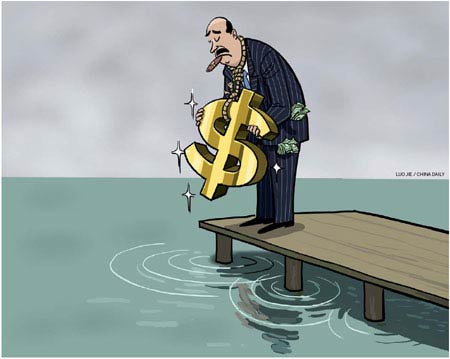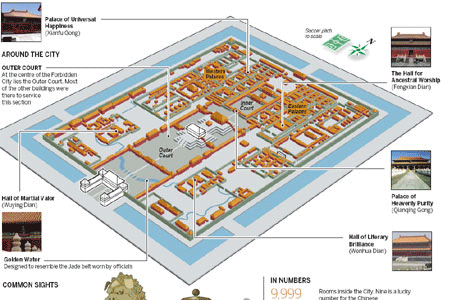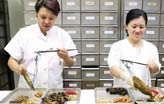Top News
Driven to death by success
Updated: 2011-09-02 11:44
By Yu Ran (China Daily)
After making a fortune, millionaires find a gaping vacuum in their lives
 |
Jiang Jie can appreciate perhaps more than most that money does not guarantee happiness. Six years ago Jiang, then 28, penniless and depressed, tried to kill himself.
"I seemed to have lost the faith to live when I discovered I was left with no money after a huge investment failure," he says.
Jiang was born into a wealthy family running a steel company in Anshan, in the northeastern province of Liaoning, and he dropped out of senior high school when he was 16.
"I chose to take over my father's company because I realized it was a shortcut to making money," he says.
By the time he was 20 he was a yuan millionaire. As the money kept on rolling in, Jiang, still relatively young and inexperienced, decided to splash out with the aim of raking in much more.
"A very promising project that was looking for investors caught my interest, and I was confident enough to put all my money into the project."
A month after Jiang invested his money the project organizer declared bankruptcy and the young man learnt that he had been duped and was left with nothing.
He took an overdose of sleeping pills, but fortunately managed to survive, and feels he has been given a second chance. "Although I am now only an ordinary white-collar worker, I feel happier and am no longer eager to make money the way I used to."
Clearly, being among the richest people in China comes with many strings attached and can be fraught with danger.
In January 2003 the industrialist Li Haicang, the founder of Shanxi Highsee Iron and Steel Group Co Ltd, was killed, shot in the back of the head with a shotgun, by an old friend.
The killer, Feng Yinliang, then shot himself dead, and police ruled that the shootings had been the result of a commercial dispute.
In September 2005, Yun Quanmin, 36, an entrepreneur from the Inner Mongolia autonomous region, was kidnapped from work. The day after the abduction, Yun was murdered, shortly after his family delivered a ransom of 2.4 million yuan.
As extreme as those cases are, they underline the perils of being a high-flying business figure, whose mortality rates are up there with those of police officers.
Between 2008 and 2010 nearly two in every 10,000 multi-millionaires with a net worth of more than 100 million yuan lost their lives; for police officers, the country's most dangerous occupation, the death rate is three in every 10,000 police officers.
Out of the 72 multi-millionaires and billionaires who have died in the past eight years, 19 died from illness; the rest died of unnatural causes.
From the time of Li Haicang's death to when the entrepreneur Ding Mingliang, former chairman of the athletic footwear maker Deerway (China) Co Ltd, died of cancer aged 52 in June, a total of 17 Chinese multi-millionaires and billionaires killed themselves, 15 were the victims of homicide, 14 were executed, and seven died in accidents.
"Suicide is becoming a complex and serious social phenomenon in our society, with the pace of life moving more rapidly and people becoming stressed more easily in their work and daily life," says Hu Shoujun, a sociology professor at Fudan University.
In May the former chairman of Shandong Zibo Wanchang Science & Technology Co Ltd, Gao Qingchang, who was reported to be suffering from depression and taking medication, fell to his death from a high-rise building three days after the company was listed on the stock exchange.
Of the 17 millionaires and billionaires who killed themselves over the past eight years the average age was 50.
Hu says that suicides among such extremely rich people in China also reflect a problem of being unable to handle the pressure after initial success.
A billionaire from Zhejiang province who wished to remain anonymous says high suicide rates among millionaires and billionaires do not surprise him.
"I've seen and heard a lot, either online or from business partners, about millionaires and billionaires killing themselves due to depression or high pressure, which I think is natural because running business is becoming harder."
The Zhejiang billionaire, who owns a group of companies and factories in several cities and plans to open an overseas office in the next two years, says wealthy people have a common problem: They never feel that the money they have is enough.
"As I make a lot of money I have to make the most of it with wise investments and to keep my companies growing, which is hard with inflation and with competition," the billionaire says.
While he has never had mental problems or considered suicide, he frequently suffers from insomnia, he says.
According to the Hurun Wealth Report 2011, China has 960,000 millionaires, including 60,000 billionaires, with personal wealth of 10 million yuan or more.
Of those millionaires, 55 percent amassed their wealth through private business, the report says.
The average age of the millionaires is 39 and of the billionaires 43.
"The lives of millionaires and billionaires are probably harder than those of poor people," says An Lan, a physiological counselor and founder of Beijing Qingweiliao, a counseling organization.
The poor can always nurse the hope of a better life ahead, he says.
"Wealthy entrepreneurs, on the other hand, become confused over their original aim of making money."
An has counseled a few successful businessmen who have made enough money for themselves and the next generation, and whose lives have become boring and meaningless.
"All those millionaires started their businesses 20 or 30 years ago with a firm determination to improve their lives, which they have obviously achieved, but feel life was still stressful and hard to enjoy the way they had wanted to."
As some of these tycoons face up to the challenge of keeping their companies growing and providing for the next generation, depression and insomnia take their toll.
Kang Rui, 27, a fuerdai, or child born to a powerful family, realizes that to cope with the pressure he will face when his father eventually hands his business to him, he needs to start building his strength now.
"I often see my father exhausted after work, under the relentless pressure of business, and I don't want that to happen to me."
Kang says that despite all the pressure on him to succeed his father, even if he has less experience he believes he can run the company wisely.
Unlike his father, he says, he has many friends outside the business world, and their leisure activities include basketball, going to karaoke bars and taking overseas trips.
"Just as I have urged my father to take a break from work, such as going on a holiday, playing golf or going to a concert, I will enjoy my leisure time with my friends and family, in addition to working hard."
Experts, too, suggest that the way for beleaguered tycoons to relieve pressure on themselves and to regain their passion for life is to communicate with friends and family, to go on trips and to do physical exercise.
"Most of the entrepreneurs I have known are out of touch with current events and everyday life, and find out they know nothing when they eventually try to talk to ordinary people," An says. "They need to get back to reality, to know the world and people around them."
As the number of wealthy people in China grows, and more of them decide life is no longer worth living, An feels he has a mission: to help them rediscover hope.
"My advice to millionaires and billionaires is this: 'Money is not the only thing in life; take a look at the colorful world and experience it; you will find your way out and truly be happier.'"
E-paper

Unveiling hidden treasures
The Forbidden City, after the Great Wall, is the most recognized tourist site in China.
Short and sweet
Game for growth
Character reference
Specials

Hunting grounds
Opinion divided as China debates opening door to international players

Flying the TCM flag
A small German town is home to Europe's flagship clinic for traditional Chinese medicine

Animal attraction
World's youngest chief fur designer set to launch own label and tap into huge China market.
